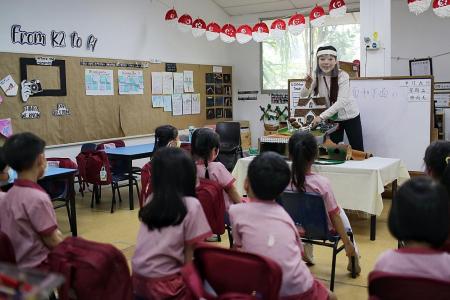Chinese pre-schoolers tend to favour own race: NTU study
As part of the majority, they are more exposed to their own racial group and children have preference for more familiar categories, says NTU researcher
Pre-school children here can develop racial preferences by age three especially if they belong to the majority race, a study by Nanyang Technological University has found.
The study showed that Chinese children in pre-schools, unlike their Indian peers, showed implicit bias (unconscious attitudes) and explicit bias (overt biased behaviours) favouring their own race.
Associate Professor Setoh Peipei, 42, who led the research, said her team's findings are consistent with the findings around the world "where pre-schoolers favour their own-gender and own-race children, and prefer to befriend native speakers of their language over children with foreign accents".
The study here involved 158 children, 87 Chinese and 71 Indians, aged three to six from more than 10 pre-schools.
The children were asked to complete three tasks.
First, they were asked to match different faces to the two races.
In the next task, researchers measured their response time in associating positive and negative stimuli - using a smiley cartoon face and a sad face - with photographs of people from both races.
Finally, the children were given the choice of an adult from each race and asked to pick whom they preferred as their music teacher, doctor or swimming coach.
Most of the children in Prof Setoh's study could categorise the races correctly, with both Chinese and Indians on a par in the task.
In the second task though, Chinese children were quicker in associating positive stimuli with faces of their own race, while the Indian children did not show any favouritism towards either race.
In the last task, Chinese children chose the Chinese adults more than half of the time, whereas Indian children had no obvious preference.
FOLLOW-UP
Prof Setoh explained that Chinese children studied tend to favour their own race, probably because they are the majority racial group in Singapore.
"It is due to familiarity and exposure. Being a majority group, the Chinese pre-schoolers are more exposed to people of their own racial group and children have a preference for more familiar categories," she said.
The study was published in 2017 in Child Development, among the world's most prestigious journals in the field of child psychology.
Prof Setoh added that she and her team are currently conducting follow-up research into what can be done for interracial integration.
She stressed that the bias - or the lack of it - also depends on whether parents and teachers are good role models.
"Children are watching and learning from us - parents' and teachers' verbal and nonverbal actions can influence children's biases."
She stressed the larger society too has a role to play.
"In order for parents' and educators' positive actions to have broad and lasting impact, they need to be incorporated by other levels of society.
"So, we need to work together as a society, across various levels," she said, adding: "The stories we tell, social media, public education, news editorials - all influence our thinking and ideas."
Get The New Paper on your phone with the free TNP app. Download from the Apple App Store or Google Play Store now

